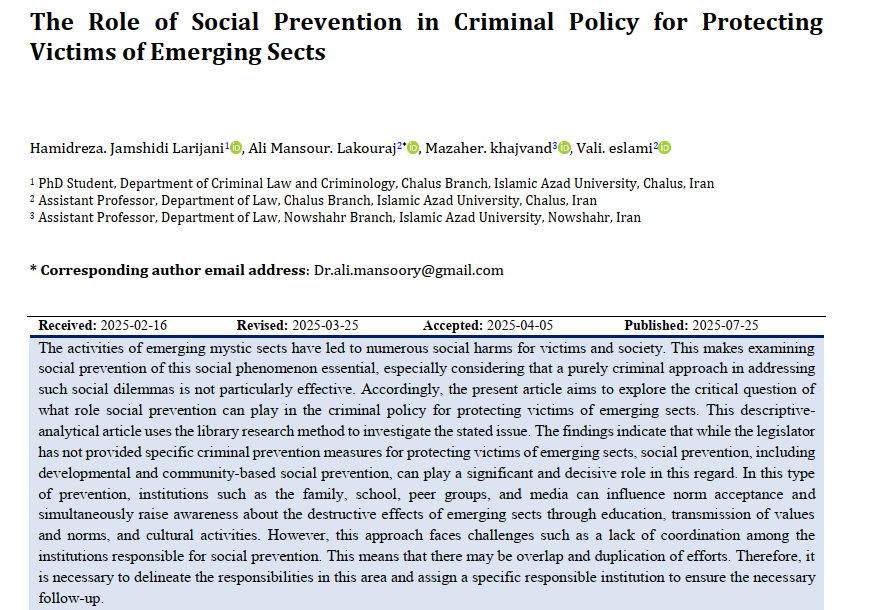The Role of Social Prevention in Criminal Policy for Protecting Victims of Emerging Sects
Keywords:
Social Prevention, Criminal Policy, Victims, Emerging SectsAbstract
The activities of emerging mystic sects have led to numerous social harms for victims and society. This makes examining social prevention of this social phenomenon essential, especially considering that a purely criminal approach in addressing such social dilemmas is not particularly effective. Accordingly, the present article aims to explore the critical question of what role social prevention can play in the criminal policy for protecting victims of emerging sects. This descriptive-analytical article uses the library research method to investigate the stated issue. The findings indicate that while the legislator has not provided specific criminal prevention measures for protecting victims of emerging sects, social prevention, including developmental and community-based social prevention, can play a significant and decisive role in this regard. In this type of prevention, institutions such as the family, school, peer groups, and media can influence norm acceptance and simultaneously raise awareness about the destructive effects of emerging sects through education, transmission of values and norms, and cultural activities. However, this approach faces challenges such as a lack of coordination among the institutions responsible for social prevention. This means that there may be overlap and duplication of efforts. Therefore, it is necessary to delineate the responsibilities in this area and assign a specific responsible institution to ensure the necessary follow-up.
Downloads
References
Ahmadzadeh Kermani, R. (2011). Rethinking Culture and Media. Chapar Publications.
Ardebili, M. A. (2008). Public Criminal Law (Vol. 2). Mizan Publications.
Barani, M. (2010). Prevention Police Report (Collection of Speeches from the Scientific-Applied Conference on Crime Prevention of the Judiciary) (Vol. 1). Public and Revolutionary Prosecutor's Office Publications of Mashhad.
Bokharai, A. (2014). Sociology of Social Deviations in Iran. Sociologists Publications.
Carrie, R. (2001). Early Psycho-Social Intervention in the Prevention of Criminal Behaviors. Journal of Legal Research, 15(35-36), 268-304.
Chalechale, F. (2008). Principles and Foundations of Crime Prevention (Part One and the Final Part). Dadrasi Monthly, 12(68), 45-55.
Danesh, T. Z. (1989). Keyhan Institute Publications.
Ebrahimi, S. (2005). Translation of the Five-Yearly Congresses on Crime Prevention and Criminal Justice - Achievements and Perspectives. Journal of Legal Justice, 69(52-53), 355-374.
Ebrahimi, S. (2012). Crime Prevention (Vol. 1). Mizan Publications.
Faghihi, A.-N. (2008). Investigating Hadiths on Educational Solutions to Prevent Abnormal Sexual Behaviors of Adolescents and Youth. Bi-Quarterly Journal of Islamic Education, 3(6), 27-56.
Ghasemi, H. (2007). The Position of the Treatise in Cultural Engineering. Andisheh and Contemporary Iranian Political History MonthlyVL - 6(58), 38-46.
Gholizadeh, B., & Shakeri, A. (2018). Leadership in Iranian Criminal Law. Journal of Legal Justice, 82(103), 99-121.
Jahansir, K. (2005). Determining Factors of Student Marriage and Its Impact on Reducing Moral Abnormalities of Students of Islamic Azad University, Maragheh Branch. Journal of Knowledge and Research in Psychology, 15(23), 115-134.
Javanmard, K. (2011). Socio-Economic Base of Family and Juvenile Delinquency. Sociologists Publications.
Kolaini, Y. q. b. I. (1983). Al-Furu' min al-Kafi (Vol. 1). Dar al-Kotob al-Islamiyeh Publications.
Majlisi, M. B. (1992). Bihar al-Anwar (Vol. 23). Dar al-Ihya al-Tarath Publications.
Mo'azzami, S. (2007). Criminological Crime Prevention. Research, Analytical and Educational Quarterly of Majd Legal, 1(1), 93-135.
Mo'idfar, S. (2001). Social Disorders or Customary Adaptation. Journal of Iranian Sociology, 3(4), 83-100.
Mohammadnasl, G. (2007). The Process of Crime Prevention. Law Quarterly - Journal of the Faculty of Law and Political Science, 40(1), 317-334.
Moland, E. (2002). The World of Christianity. Amir Kabir Publications.
Najafi Abrand Abadi, A. H. (2004). Just Crime Prevention Included in Criminal Sciences (Collection of Articles in Honor of Dr. Ashouri). Samt Publications.
Ravdrad, A. (2009). The Role of Religious and Non-Religious Planning in Reducing and Increasing Religiosity. Quarterly Journal of Cultural Research, 2(6), 49-78.
Rayejian Asli, M. (2004). A New Approach to the Theoretical Foundations of Crime Prevention. Journal of Legal Justice, 9(48-49), 123-168.
Rocque, M., Welsh, B. C., & Raine, A. (2012). Biosocial criminology and modern crime prevention. Journal of Criminal Justice, 40(2), 306-312. https://doi.org/10.1016/j.jcrimjus.2012.05.003
Salehi, J., & Faraji-ha, M. (2007). Delinquency of Children and Adolescents On Crime Prevention in Current Iranian Law (Vol. 12). Mizan Publications. https://doi.org/10.1163/1571817041268883
Shakeri, A., & Abdi, T. (2016). Investigating the Security Consequences of Youths' Tendency Towards Emerging False Mysticism. Qom Police Science Journal(9), 71-94.
Shambiati, H. (2006). Delinquency of Children and Adolescents. Majd and Zubin Publications.
Shapouri, M., & Ebrahimi Varkiani, M. (2014). Investigation of Moharebeh and Corruption on Earth with the Focus on the Opinions of Imam Khomeini (RA). Research Letter of Matin, 16(65), 1-22.
Sotudeh, H. (2007). Social Pathology (Sociology of Deviations). Avaye Noor Publications.
Taghizadeh Shahrokhabadi, M. (2013). An Analytical Look at the Innovation of Hadd Crimes in the Penal Code of 2013. Quarterly Journal of Legal Research of Qanun Yar, 4(14), 285-324.
Welsh, B. C., & Farrington, D. P. (2012). Science Toward a new crime policy. Jurnal of Criminal Justice, 40(2), 128-133. https://doi.org/10.1016/j.jcrimjus.2012.01.008

Downloads
Additional Files
Published
Submitted
Revised
Accepted
Issue
Section
License
Copyright (c) 2025 Hamidreza Jamshidi Larijani, Ali Mansour Lakouraj, mazaher khajvand, Vali eslami (Author)

This work is licensed under a Creative Commons Attribution-NonCommercial 4.0 International License.





